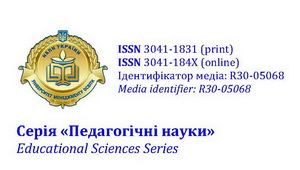Organization of training in informatics courses using collaborative technologie
Анотація
Ключові слова
Повний текст:
PDF (English)Посилання
REFERENCES / СПИСОК ВИКОРИСТАНИХ ДЖЕРЕЛ
N. Ə. Abışov, Müasir informasiya-kommunikasiya texnologiyalarının tədris prosesinə tətbiqi. Bakı, Azərbaycan : Elm, 2011.
F. Ağayeva, «Videokommunikasiyaların distant təhsildə rolu», Azərbaycan Respublikasının Təhsil İnstitutunun Elmi Əsərləri, № 6, s. 263–271, 2017.
H. H. Əhmədov, Azərbaycan təhsilinin inkişaf strategiyası. Bakı, Azərbaycan : «Elm» nəşriyyatı, 2010.
Ə. Q. Pələngov, Proqramlaşdırma dilləri. Bakı, Azərbaycan, 2011.
A. İ. Pürhani, «Komputer texnologiyalarının öyrədici imkanları», AMEA –nın Gəncə bölməsi. Xəbərlər məcmuəsi, Pedadoji elmlər seriyası, № 1, səh. 100–104, 2021.
N. S. Buslova, «Features of organizing the course “Computer Science and Information Technologies” in the context of distance learning», Problems and prospects for the development of education in Russia, No. 2, p. 88–92, 2010.
E. V. Voznesenskaya, “Distance learning – history of development and current trends in the educational space”, Science and School, No. 1, p. 116–123, 2017.
V. M. Kadnevsky, S. K. Kaldybaev, V. D. Polezhaev, M. V. Polezhaeva, Traditional and innovative means of assessment and control in education. Omsk, Russia: Publishing house. Omsk State Technical University, 2012.
T. V. Lugovaya, Educational cooperation. Contents and technology of organization. Moscow, Russia, 2015.
I. G. Semakin, I. N. Martynova, “Personal and meta-subject results of teaching computer science at the profile level”, Informatics and Education, No. 2, p. 34–39, 2012.
G. A. Tsukerman, Types of communication in teaching. Tomsk, Russia: Peleng, 1993.
TRANSLATED AND TRANSLITERATED / ПЕРЕКЛАД, ТРАНСЛІТЕРАЦІЯ
N. A. Abishov, Application of modern information and communication technologies to the teaching process. Baku, Azerbaijan : Elm, 2011. (in Azerbaijani)
F. Aghayeva, "The role of video communications in distance education", Scientific Works of the Institute of Education of the Republic of Azerbaijan, No. 6, p. 263–271, 2017. (in Azerbaijani)
H. H. Ahmadov, Development strategy of Azerbaijani education. Baku, Azerbaijan: "Elm" publishing house, 2010. (in Azerbaijani)
A. G. Palangov, Programming languages. Baku, Azerbaijan, 2011. (in Azerbaijani)
A. I. Pürhani, "Educational possibilities of computer technologies", Ganja branch of ANAS. News collection, Pedagogical science series, No. 1, p. 100–104, 2021. (in Azerbaijani)
N. S. Buslova, «Osobennosti organizacii kursa"Informatika i informacionnye tekhnologii" v usloviyah distancionnogo obucheniya», Problemy i perspektivy razvitiya obrazovaniya v Rossii, № 2, s. 88–92, 2010. (in Russian)
E. V. Voznesenskaya, «Distancionnoe obuchenie – istoriya razvitiya i sovremennye tendencii v obrazovatel'nom prostranstve», Nauka i SHkola, № 1, s. 116–123, 2017. (in Russian)
V. M. Kadnevskij, S. K. Kaldybaev, V. D. Polezhaev, M. V. Polezhaeva, Tradicionnye i innovacionnye sredstva ocenivaniya i kontrolya v obrazovanii. Omsk, Rossi : Izd. OmGTU, 2012. (in Russian)
T. V. Lugovaya, Uchebnoe sotrudnichestvo. Soderzhanie i tekhnologiya organizacii. Moskva, Rossiya, 2015. (in Russian)
I. G. Semakin, I. N. Martynova, «Lichnostnye i metapredmetnye rezul'taty obucheniya informatike na profil'nom urovne», Informatika i obrazovanie, № 2, s. 34–39, 2012. (in Russian)
G. A. Cukerman, Vidy obshcheniya v obuchenii. Tomsk, Rossiya : Peleng, 1993. (in Russian)
Посилання
- Поки немає зовнішніх посилань.
